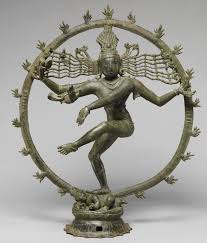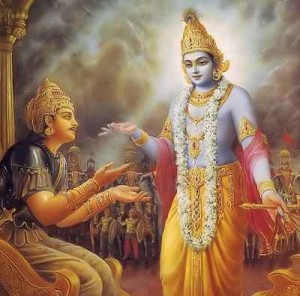Bhaghavad Gita : He who sees Me everywhere and sees all in Me, to him I do not get lost, nor does he get lost to Me.
“Motionless like the light of a lamp in a windless place is the controlled consciousness (free from its restless action, shut in from its outward motion) of the Yogin who practises union with the Self.
That in which the mind becomes silent and still by the practice of Yoga: that in which the Self is seen within in the Self by the Self (seen, not as it is mistranslated falsely or partially by the mind and represented to us through the ego, but self-perceived by the Self, swaprakasha), and the soul is satisfied.

That in which the soul knows its own true and exceeding bliss, which is perceived by the intelligence and is beyond the senses, wherein established, it can no longer fall away from the spiritual truth of its being.
That is the greatest of all gains and the treasure beside which all lose their value, wherein established he is not disturbed by the fieriest assault of mental grief.
It is the putting away of the contact with pain, the divorce of the mind’s marriage with grief. The firm winning of this inalienable spiritual bliss is Yoga; it is the divine union. This Yoga is to be resolutely practised without yielding to any discouragement by difficulty or failure (until the release, until the bliss of Nirvana is secured as an eternal possession).
Abandoning without any exception or residue all the desires born of the desire-will and holding the senses by the mind so that they shall not run to all sides (after their usual disorderly and restless habit), one should slowly cease from mental action by a buddhi held in the grasp of fixity, and having fixed the mind in the higher Self one should not think of anything at all.

Whenever the restless and unquiet mind goes forth, it should be controlled and brought into subjection in the Self.
When the mind is thoroughly quieted, then there comes upon the Yogin stainless, passionless, the highest bliss of the soul that has become the Brahman.
Thus freed from stain of passion and putting himself constantly into Yoga, the Yogin easily and happily enjoys the touch of the Brahman which is an exceeding bliss.
The one whose self is in Yoga, sees the self in all beings and all beings in the self, he is equal-visioned everywhere.
He who sees Me everywhere and sees all in Me, to him I do not get lost, nor does he get lost to Me.
Chapter VI, 19-30

Laisser un commentaire